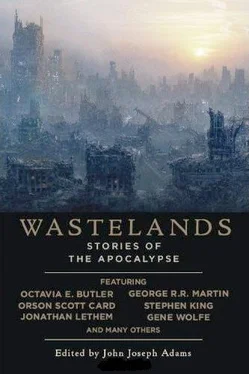But Peter is watching Rachel, not Mamie. “The chicken isn’t from Outside, Rachel. It’s from that chicken-yard in Block B. I heard you say how clean they are.”
“Yeah,” Rachel says shortly, gracelessly.
Mamie rolls her eyes. “Say ‘thank you.’ darling. Pete went to a lot of trouble to get this chicken.”
“Thanks.”
“Can’t you say it like you mean it?” Mamie’s voice goes shrill.
“Thanks,” Rachel says. She heads towards our three-walled bedroom. Peter, still watching her closely, shifts the chicken from one hand to the other. The pressure of the string bag cuts lines across the chicken’s yellowish skin.
“Rachel Anne Wilson—”
“Let her go,” Peter says softly.
“No,” Mamie says. Between the five crisscrossing lines of disease, her face sets in unlovely lines. “She can at least learn some manners. And I want her to hear our announcement! Rachel, you just come right back out here this minute!”
Rachel returns from the bedroom; I’ve never known her to disobey her mother. She pauses by the open bedroom door, waiting. Two empty candle scones, both blackened by old smoke, frame her head. It has been since at least last winter that we’ve had candles for them. Mamie, her forehead creased in irritation, smiles brightly.
“This is a special dinner, all of you. Pete and I have an announcement. We’re going to get married.”
“That’s right,” Peter says. “Congratulate us.”
Rachel, already motionless, somehow goes even stiller. Peter watches her carefully. Mamie casts down her eyes, blushing, and I feet a stab of impatient pity for my daughter, propping up mid-thirties girlishness on such a slender reed as Peter Malone. I stare at him hard. If he ever touches Rachel…but I don’t really think he would. Things like that don’t happen anymore. Not Inside.
“Congratulations,” Rachel mumbles. She crosses the room and embraces her mother, who hugs her back with theatrical fervor. In another minute, Mamie will start to cry. Over her shoulder I glimpse Rachel’s face, momentarily sorrowing and loving, and I drop my eyes.
“Well! This calls for a toast!” Mamie cries gaily. She winks, makes a clumsy pirouette, and pulls a bottle from the back shelf of the cupboard Rachel got at the last donations lottery. The cupboard looks strange in our kitchen: gleaming white lacquer, vaguely Oriental-looking, amid the wobbly chairs and scarred table with the broken drawer no one has ever gotten around to mending. Mamie flourishes the bottle, which I didn’t know was there. It’s champagne.
What had they been thinking, the Outsiders who donated champagne to a disease colony? Poor devils, even if they never have anything to celebrate…Or Here’s something they won’t know what to do with…Or Better them than me—as long as the sickies stay Inside…It doesn’t really matter.
“I just love champagne!” Mamie cries feverishly; I think she has drunk it once. “And oh look—here’s someone else to help us celebrate! Come in, Jennie—come in and have some champagne!”
Jennie comes in, smiling. I see the same eager excitement that animated Rachel before her mother’s announcement. It glows on Jennie’s face, which is beautiful. She has no disease on her hands or her face. She must have it somewhere, she was born Inside, but one doesn’t ask that. Probably Rachel knows. The two girls are inseparable. Jennie, the daughter of Mamie’s dead husband’s brother, is Rachel’s cousin, and technically Mamie is her guardian. But no one pays attention to such things anymore, and Jennie lives with some people in a barracks in the next Block, although Rachel and I asked her to live here. She shook her head, the beautiful hair so blonde it’s almost white bouncing on her shoulders, and blushed in embarrassment, painfully not looking at Mamie.
“I’m getting married, Jennie,” Mamie says, again casting down her eyes bashfully. I wonder what she did, and with whom, to get the champagne.
“Congratulations!” Jennie says warmly. “You, too, Peter.”
“Call me Pete,” he says, as he has said before. I catch his hungry look at Jennie. She doesn’t, but some sixth sense —even here, even Inside—makes her step slightly backwards. I know she will go on calling him ‘Peter.’
Mamie says to Jennie, “Have some more champagne. Stay for dinner.”
With her eyes Jennie measures the amount of champagne in the bottle, the size of the chicken bleeding slightly on the table. She measures unobtrusively, and then of course she lies. “I’m sorry, I can’t—we ate our meal at noon today. I just wanted to ask if I could bring someone over to see you later, Gram. A visitor.” Her voice drops to a hush, and the glow is back. “From Outside.”
I look at her sparkling blue eyes, at Rachel’s face, and I don’t have the heart to refuse. Even though I can guess, as the two girls can not, how the visit will be. I am not Jennie’s grandmother, but she has called me that since she was three. “All right.”
“Oh, thank you!” Jennie cries, and she and Rachel look at each other with delight. “I’m so glad you said yes, or else we might never get to talk to a visitor up close at all!”
“You’re welcome,” I say. They are so young. Mamie looks petulant; her announcement has been upstaged. Peter watches Jennie as she impulsively hugs Rachel. Suddenly I know that he too is wondering where Jennie’s body is diseased, and how much. He catches my eye and looked at the floor, his dark eyes lidded, half ashamed. But only half. A log cackles in the wooden stove, and for a brief moment the fire flares.
#
The next afternoon Jennie brings the visitor. He surprises me immediately: he isn’t wearing a sani-suit, and he isn’t a sociologist.
In the years following the internments, the disease colonies had a lot of visitors. Doctors still hopeful of a cure for the thick gray ridges of skin that spread slowly over a human body—or didn’t, nobody knew why. Disfiguring. Ugly. Maybe eventually fatal. And communicable. That was the biggie: communicable. So doctors in sani-suits came looking for causes or cures. Journalists in sani-suits came looking for stories with four-color photo spreads. Legislative fact-finding committees in sani-suits came looking for facts, at least until Congress took away the power of colonies to vote, pressured by taxpayers who, increasingly pressured themselves, resented our dollar-dependent status. And the sociologists came in droves, minicams in hand, ready to record the collapse of the ill-organized and ill colonies into street-gang, dog-eat-dog anarchy.
Later, when this did not happen, different sociologists came in later-model sani-suits to record the reasons why the colonies were not collapsing on schedule. All these groups went away dissatisfied. There was no cure, no cause, no story, no collapse, no reasons.
The sociologists hung on longer than anybody else. Journalists have to be timely and interesting, but sociologists merely have to publish. Besides, everything in their cultural tradition told them that Inside must sooner or later degenerate into war zones: Deprive people of electricity (power became expensive), of municipal police (who refused to go Inside), of freedom to leave, of political clout, of jobs, of freeways and movie theatres and federal judges and state administered elementary school accreditation-and you get unrestrained violence to just survive. Everything in the culture said so. Bombed-out inner cities. Lord of the Flies. The Chicago projects. Western movies. Prison memoirs. The Bronx. East L.A. Thomas Hobbes. The sociologists knew.
Only it didn’t happen.
The sociologists waited. And Inside we learned to grow vegetables and raise chickens who, we learned, will eat anything. Those of us with computer knowledge worked real jobs over modems for a few years-maybes it was as long as a decade-before the equipment became too obsolete and unreplaced. Those who had been teachers organized classes among the children, although the curriculum, I think, must have gotten simpler every year: Rachel and Jennie don’t seem to have much knowledge of history or science. Doctors practiced with medicines donated by corporations for the tax write-offs, and after a decade or so they began to train apprentices. For a while-it might have been a long while-we listened to radios and watched TV. Maybe some people still do, if we have any working ones donated from Outside.
Читать дальше












